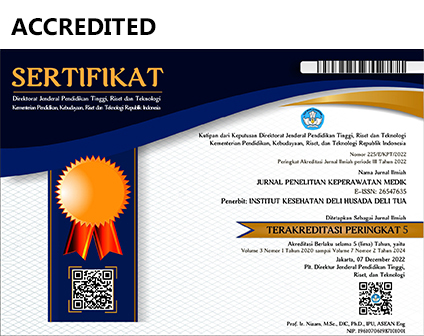PENGARUH TERAPI ICE CUBES TERHADAP PENURUNAN RASA HAUS PADA PASIEN GAGAL GINJAL KRONIK YANG MENJALANI HEMODIALISA DI RSU SEMBIRING
Abstract
Chronic renal failure patients undergoing hemodialysis must comply with fluid restrictions, to prevent excess fluid from occurring which can worsen the condition of chronic kidney failure patients, but fluid restriction can lead to a decrease in oral intake resulting in dry mouth and tongue rarely flowing water and this condition can trigger thirst. One of the ways to manage thirst is with ice cube's therapy. The purpose of this study was to determine the effect of ice cube's therapy on reducing thirst in chronic kidney failure patients undergoing hemodialysis. Pre-experimental research design using a one group pretest-posttest design. The samples in this study amounted to 18 respondents using purposive sampling technique. The instrument for applying ice cube's therapy uses the VAS (Visual Analog Scale) for Assessment of Thirst Intensity. Ice cube's therapy is given for 5 minutes during the dialysis process. The results of the Paired T-test statistic in this study showed that there was a decrease in the intensity of thirst by an average of 2.56 with a significance value of p value = 0.000 (p <0.05). Based on the research findings, there is an effect of ice cube's therapy on reducing thirst in chronic kidney failure patients undergoing hemodialysis. The application of ice cube's therapy is proven to be able to reduce thirst so that it can be useful and applied to chronic kidney failure patients undergoing hemodialysis.








